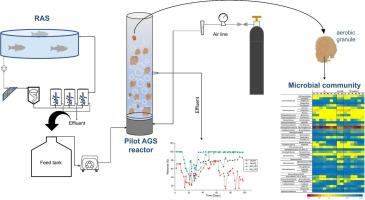Aquacultural Engineering ( IF 4 ) Pub Date : 2023-08-19 , DOI: 10.1016/j.aquaeng.2023.102361 Talvikki Suhonen , Raed A. Al-Juboori , Antonina Kruglova , Jani Pulkkinen , Jouni Vielma , Anna Mikola

|
This study presents for the first time an evaluation of the feasibility of aerobic granular sludge (AGS) for treating recirculating aquaculture system (RAS) effluent in a sequential batch reactor configuration for nutrient removal. An AGS process was started using synthetic wastewater to grow the granules, and the feed was then switched to RAS effluent, and a systematically decreasing carbon supplementation was applied. Total nitrogen removal significantly decreased from around 75 % to as low as 13 %, but granules could restore their performance when allowed enough time (2 weeks) to acclimate to the change in feed. The dynamics of AGS microbial communities were followed by Illumina sequencing. A high abundance of microbial populations—indicating dense and stable granules—was observed after 97 days of operation with RAS wastewater. In particular, the genera Neomegalonema, Hydrogenophaga, Thauera, Bdellovibrio, Flavobacterium, and Pseudomonas represented most of the community, showing the heterotrophic, denitrifying, and phosphorus-accumulating potential of the studied operational design. The AGS showed promising results for a small-footprint solution for RAS treatment, but the energy consumption of aeration and carbon addition still requires further development.
中文翻译:

好氧颗粒污泥在循环水产养殖系统废水处理中的新兴应用:性能、颗粒形成和微生物群落
这项研究首次评估了好氧颗粒污泥(AGS)在顺序间歇式反应器配置中处理循环水产养殖系统(RAS)废水以去除营养物的可行性。AGS 工艺开始使用合成废水来生长颗粒,然后将进料切换为 RAS 废水,并应用系统性减少碳补充。总氮去除率显着下降,从约 75% 降至 13%,但如果有足够的时间(两周)来适应饲料的变化,颗粒剂可以恢复其性能。通过 Illumina 测序跟踪 AGS 微生物群落的动态。RAS 废水运行 97 天后,观察到大量的微生物种群(表明颗粒密集且稳定)。尤其,Neomegalonema、Hydrogenophaga、Thauera、Bdellovibrio、黄杆菌和假单胞菌代表了大部分群落,显示了所研究的操作设计的异养、反硝化和磷积累潜力。AGS 对于 RAS 处理的小足迹解决方案显示出有希望的结果,但曝气和碳添加的能耗仍需要进一步开发。



























 京公网安备 11010802027423号
京公网安备 11010802027423号